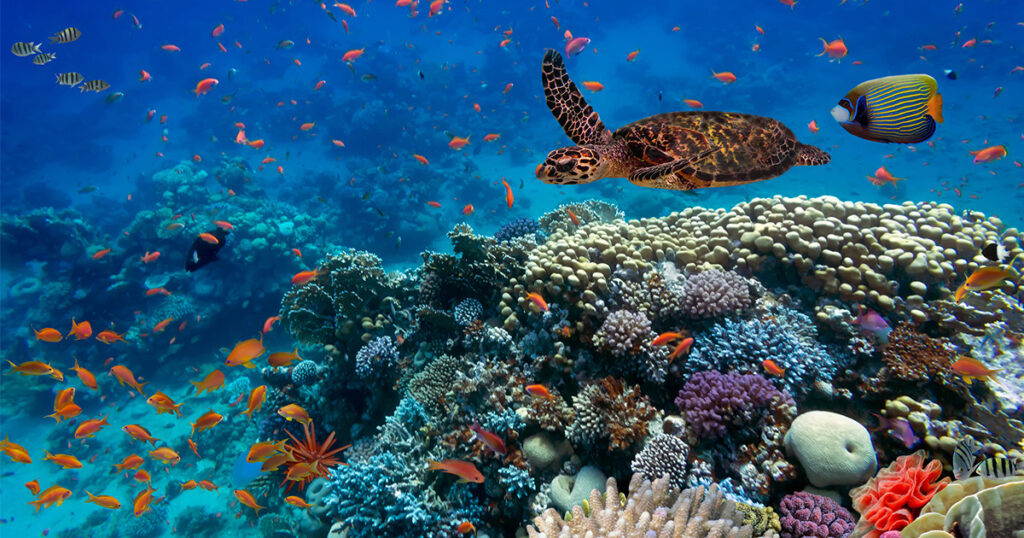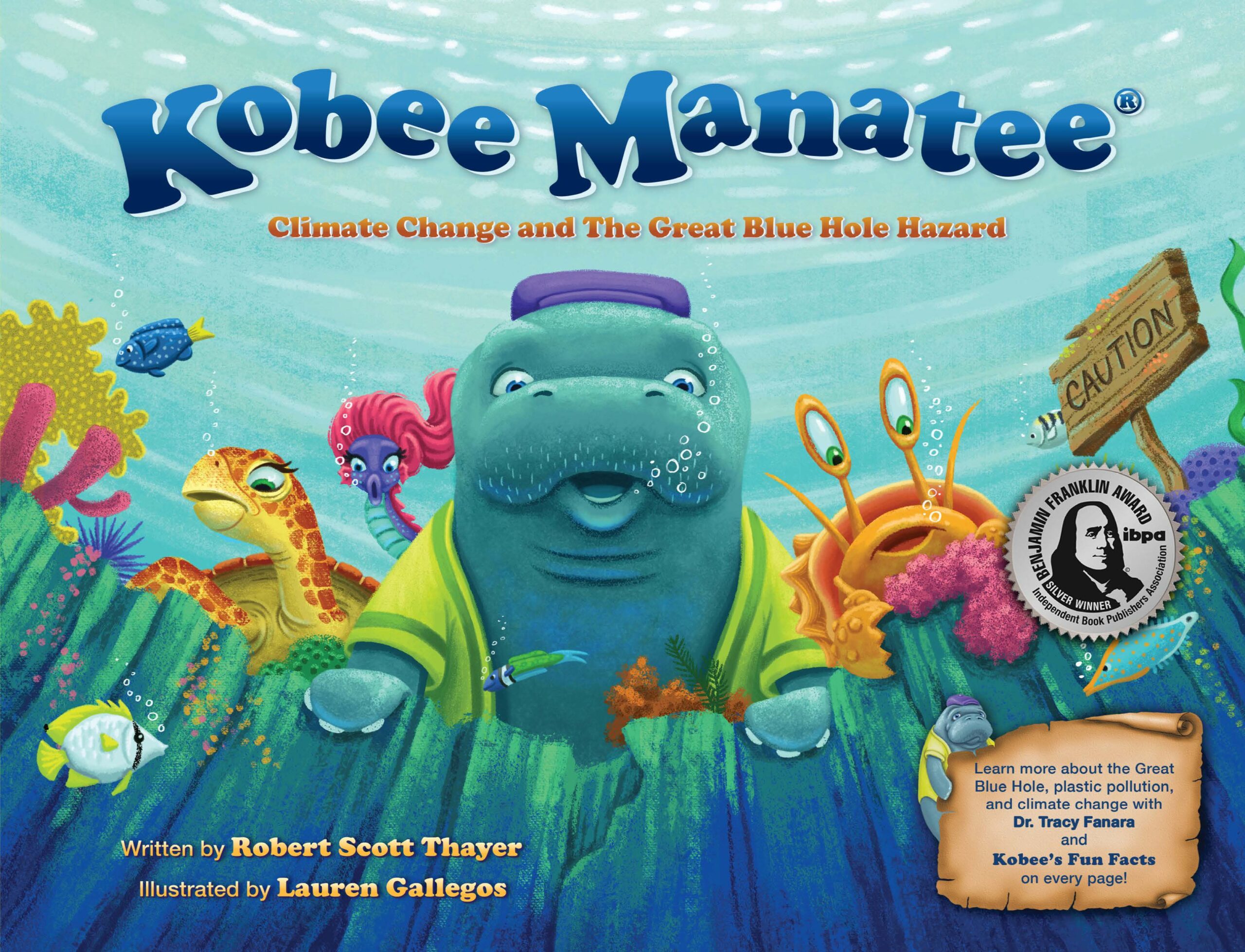World Oceans Day Breaches Rising Tide of Unsettling News

Greetings! World Oceans Day is a time to celebrate the seas, which make up more than 70% of our planet. While it is a time to admire the beauty that lies beneath the waves, it is also a time to be very concerned with what is destroying its beauty – human caused climate change.
An IPCC report published in 2019 explained that our oceans, “have absorbed between 20% and 30% of human-made carbon dioxide emissions since the 1980s.” According to the United Nations Intergovernmental Panel on Climate Change our oceans have been, “responsible for absorbing more than 93% of the combined heat stored by warmed air, sea, and land, and melted ice since the 1970s.”
Unfortunately, unsettling news about its tipping point is near. And it just so happens that the theme of the United Nations World Oceans Day 2022 is “collective actions taken now could revitalize oceans to a healthier state.”
Lea d’Auriol, Founder of the nonprofit Oceanic Global said, “We really see oceans as the biggest ally in the climate change crisis.”
This is how climate change is affecting the health of the world’s oceans:
Species are faced with adapting or becoming extinct
d’Auriol said, “Currently, the oceans are in a state of complete imbalance that has nearly doubled since the 1990s. Look no further than the fishermen, who supply sustenance to more than 3 billion people who rely on seafood as their main source of protein, as witnesses that climate change is already here.”
Arlo Hemphill, senior oceans campaigner for Greenpeace USA explained, “If you wanted to ask someone if climate change is really happening, probably the surest answer you’d get from anyone aside from a scientist is a fisherman because fishermen are seeing these things happen in real time.”
Martin Grosell, professor of ichthyology and chair of the University of Miami’s Department of Marine Biology and Ecology said, “One of the changes long-time fishermen are witnessing is the presence of new species venturing north as the area with their preferred water temperature expands. Marine organisms maintain the same temperature as the surrounding water, so when that when temperature increases, so does the temperature of the organism. As the temperature rises, the organisms require more energy to move and survive. But, conversely, the levels of oxygen in the water decrease as the temperature warms, forcing the species to move.”
Anne Christanson, Director of International Climate Policy for the Center of American Progress said, “Conversely, species are continuing to die off due to repeated events of marine heatwaves.”
Lea d’Auriol said, “Coral reefs are among the most threatened marine ecosystems in the world. Coral bleaching, a process that occurs when water is too warm and the algae the corals expel from their tissues, causing them to turn completely white, is happening at “alarming” rates — increasing by a rate of 4% per year — along with an uptick in mortality events along entire regions.”
The National Academy of Sciences published a study explaining, “Coral reefs could stop growing in 10 years unless greenhouse gases are significantly reduced and that, under a worst-case scenario, 94% of all reefs could erode by 2050.”
Lea d’Auriol said, “Vegetation such as mangroves, seagrass plants and marshes, some of the largest carbon sinks on the planet, which absorb and store carbon dioxide from the atmosphere, are also at risk of extinction.” And as you may already know, seagrass is the manatee’s main diet source.
The number of dead zones are increasing
Dr. Tracy Fanara, NOAA Scientist explained, “A dead zone, occurs when an algal bloom depletes all the oxygen in a specific area, making it impossible for marine life to survive.” Tracy also studies Red Tide bloom invasions in the Gulf of Mexico and around Florida’s coasts in an attempt to mitigate these serious issues affecting fish, marine mammals and humans.
Help Children learn more on Climate Change with Easy Effortless Reading from
Author Robert Scott Thayer and Dr. Tracy Fanara!
Our award-winning fourth installment in the Kobee Manatee® Children’s Educational Picture Book series is an easy and effortless tool teaching kids about climate change.

When you read this award-winning educational picture book to children, you’ll discover it’s a fun and fictional adventure loaded with weaved in facts on climate change and plastic pollution. This helps children learn about this serious subject in a fun and entertaining way. You can order it here: https://www.kobeemanatee.com/products/kobee-manatee-climate-change-and-the-great-blue-hole-hazard/
Here’s a brief synopsis …
Kobee Manatee, the protagonist and his seafaring pals, Tess the seahorse and Pablo the hermit crab swim from the Cayman Islands to Belize. Kobee wants to help his cousin Quinn clean up plastic litter at her new, all-veggie underwater bistro called Quinn’s Seagrass Café.
On their Caribbean journey they encounter harmful effects of climate change and plastic pollution. As if that wasn’t enough, several other unforeseen problems occur with a distressed loggerhead turtle, a giant Portuguese man-of-war, and a venomous scorpionfish. They’re all amazed when they discover the extraordinary Great Blue Hole. Then their adventure takes another crazy turn when Pablo plunges into its huge abyss!
Each page includes in-depth, scientific details on climate change and plastic pollution in our oceans with Dr. Tracy Fanara, Inspector Planet & NOAA Scientist. Tracy can be seen on The Weather Channel as a visiting expert and she’s also seen on their “Weird Earth” segments.
We have Fantastic Reviews on this New Release!
“A well-crafted, thoughtful, and well-illustrated addition to a noteworthy educational book series.” —Kirkus Reviews
“Robert Scott Thayer presents an important environmental message in an engaging story with wonderful characters. Anyone who loves the ocean and wants to help save it should read Kobee Manatee: Climate Change and The Great Blue Hole Hazard. I’m looking forward to the next Kobee Manatee adventure.” —Readers’ Favorite
For young readers who enjoy imaginative tales surrounding affable and heroic sea creatures, as well as parents and/or teachers looking for a way to introduce youngsters to the importance of marine conservation, Kobee Manatee® Climate Change and The Great Blue Hole Hazard offers a perfect blend. Highly recommended! – Chanticleer Book Reviews
Keep watching for more of my updates on climate change!
If you see any sick or injured manatees, please call the Florida Fish and Wildlife Conservation Commission at: 1-888-404-3922 (FWCC). They are the folks who are responsible for rescuing us in Florida.
Here’s the Save the Manatee Club link to learn more about us manatees …
Here’s a cool link for you to learn more about how we’re rescued and brought into rehabilitation …
~ Robert Scott Thayer
Related Posts